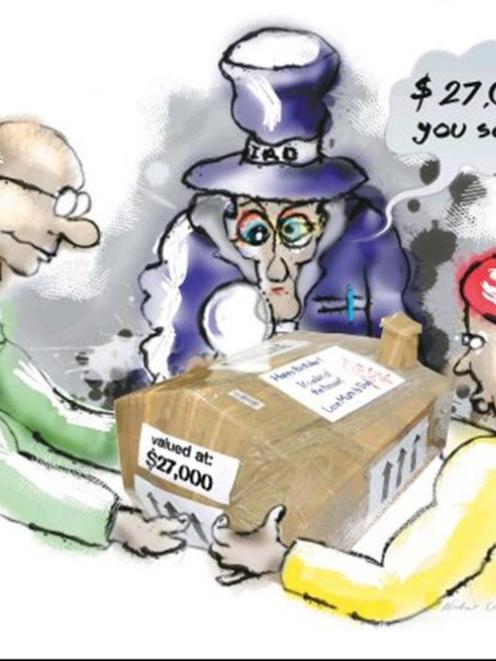
At present, up to $27,000 a year can be gifted without attracting duty.
Farmers and business owners have traditionally been seen as the major users of the gifting process but increasingly, ordinary households have been using the $27,000 a year to help their children or protect their assets as old age advances.
One of the most common ploys is gifting a house or property so that the family maintain the full asset when it comes to rest-home care for the original owner.
Deloitte Dunedin tax partner Peter Truman said gift duty was originally introduced to prevent people avoiding estate duty by giving away assets before they died.
Estate duty was abolished in 1992 but gift duty had remained in place.
Gifts made on death, such as through the provisions of a will, were not subject to gift duty.
Treasury forecasts showed gift duty revenue for the Government was about $1 million a year.
"There are significant costs for Inland Revenue in collecting this revenue and also on the economy in general, as people structure their affairs to circumvent gift duty liabilities.
"The Government has come to the conclusion that collecting gift duty as a revenue source is inefficient. It has decided to shift its focus on protecting against the mischief that occurs if people had an unlimited ability to give away their property," Mr Truman said.
The issues the Government would be concerned to address were.-
Gifting property to disadvantage creditors. If someone was about to enter bankruptcy, they could give away their remaining assets to family members. Creditors would then miss out on the proceeds from the forced sale of those assets.
Gifting property to ensure rest-home subsidies were still payable. Many New Zealanders had transferred their family homes into family trusts in an attempt to retain the value of those for their childrenratherthan the Government's requiring them to be sold to meet the cost of rest-home care.
Gifting property to other entities or persons to access lower tax rates. People on high rates of marginal tax might prefer investments to be owned by a trust or other family members so a lower tax rate applied to income from those investments.
Mr Truman suspected the cost to the Government of administering gift duty consumed at least all of the $1 million estimated annual revenue.
The compliance-cost savings to the economy through the repeal of gift duty would be most welcome.
A couple would typically spend between $250 to $400 a year on legal fees to undertake a gifting programme.
Given the low exemption level, gifting programmes typically went on for many years.
In his experience, the only situations where people actually paid gift duty were when they had inadvertently made two gifts of $27,000 within a 12-month period, Mr Truman said.
That meant paying gift duty on the second gift. Where there was a small amount above the $27,000 outstanding, it was cheaper to pay gift duty rather than incur another year's legal fees.
"The Government can be expected to toughen its approach to rest-home subsidies where individuals have previously occupied a house owned by a trust of which their immediate family are the primary beneficiaries."
It was also expected specific legislation would be introduced to provide defeated creditors with the ability to void gifts made during a specified period before an insolvency.
That would give creditors the ability to have the gift reversed so the property was available to meet the claims of creditors, he said.
The Government had suggested the tax concerns with gifting had reduced now that marginal tax rates had been flattened. The top individual rate would fall from 38% to 33% on October 1, the same rate as trusts paid on income retained within trusts.
The general anti-avoidance provisions in the Income Tax Act 2007 would provide the Inland Revenue Department with the ability to void any tax advantages available through gifts where the commissioner formed the view that tax avoidance was a "significant driver" of the decision to make the gift.
"Overall, the decision to abolish gift duty makes sense," Mr Truman said.
There was no net revenue cost to the Government and the mischief on which gift duty now acted as a handbrake could be dealt with by some targeted legislative provisions.
The legislative changes might affect gifts made before the change so the effect of those needed to be reviewed further once the actual proposals were released by the Government, he said.
HOW IT WORKS
A common transaction is for a couple to move their house into a family trust.
Say the house is worth $500,000, the couple will sell the house to the trust and receive a debt owed by the trust for $500,000.
The couple can forgive $54,000 of the debt each year ($27,000 each) and after nine years and a few months, the debt has been fully forgiven. The trust now owns the house outright and the couple have given away a $500,000 asset.
If instead the couple had gifted the house to the trust in one transaction, gift duty of $100,700 would have been payable by the couple.
With a gifting programme, the same outcome was achieved in time but without the Government collecting any gift duty.
GIFT DUTY
• Up to $27,000: nil.
• $27,001 to $36,000: 5% on value above $27,000.
• $36,001 to $54,000: $450 plus 10% on value above $36,000.
• $54,001 to $72,000: $2250 plus 20% on value above $54,000.
• Above $72,000 $5850 plus 25% on value above $72,000.

